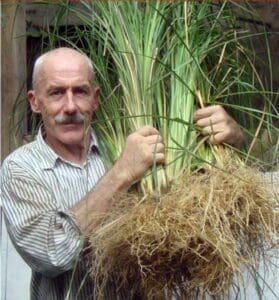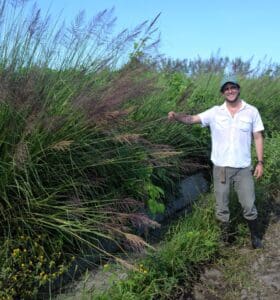As recently announced by Rafael Luque, Coordinator of the Latin American Vetiver Network, Antonio Carrillo Bolea, from Mexico, and Piet Sabbe, from Ecuador, have stepped forward and volunteered to be the National Vetiver Coordinators for their respective countries.

Those of you who have followed the work being done by some of the truly outstanding Vetiverites globally and/or in Latin America, will certainly be familiar with Piet Sabbe. Piet is one of the pioneers of Vetiver System in Latin America, having begun back in the mid-1990s with the restoration of what came to be called the “Parque Bambú” – 15 ha of degraded, denuded, and exhausted land in the western foothills of the Andes in the north of Ecuador. With the founding of the Latin American Vetiver Network in 1995, Piet immediately became one of, if not the most active, partners of the Network in the promotion and introduction of vetiver technology in Ecuador. In 2000, Piet became the first Coordinator of Ecuador’s National Network, and we are very happy that he has volunteered to step back into that position again. He is a tireless worker, promoting and applying the Vetiver System in Ecuador, and his work and vision are referenced both nationally and internationally. Also, Piet’s short video “Vetiver in Contour Lines on Your Estate” won the 2023 Vetiver Short Video Competition Video and, on the occasion of ICV-7, he received a special King of Thailand Award from the Thai organizers for the video.

For his part, Antonio Carrillo Bolea is a regenerative agriculture specialist who focuses upon agroforestry systems, permaculture and keyline design. He has been working with Vetiver in Mexico since 2005, in several different Vetiver System projects within major agricultural supply chains, e.g., sugar cane, tobacco, livestock and coffee farming. He has provided Vetiver training for farmers in different contexts and is especially interested in the combination of the Vetiver System and keyline hydrological design as a minimum standard for regenerative agriculture supply chains. He is also the co-founder and CEO of Estampa Verde, a hybrid enterprise model with a non-profit arm focused on international cooperation, research and outreach of the vetiver system, and a for-profit arm that provides quality plant material and consulting services for the design and implementation of the vetiver system on Keyline for watershed regeneration and agroecological transformation of agriculture and food systems. He received the King of Thailand Vetiver Award 2023 for the most outstanding people participation in the field of disaster mitigation and environmental protection. This recognition was due to his standardization of Keyline Vetiver Hedges, setting a benchmark for high-quality design and implementation procedures. His paper and a video of his presentation are available.
Antonio has also shared his vision for the Mexican Vetiver Network, under his leadership:
Embracing a regenerative future: A Vision for Vetiver System Coordination in Mexico
As I step into the esteemed role of Vetiver Network Coordinator for Mexico, I am honored to share my vision and commitment to spearheading transformative change through the promotion and advancement of the Vetiver System.
My vision revolves around a comprehensive approach, aimed at fostering regenerative agriculture within Mexico’s agricultural supply chains. The integration of the Vetiver System holds immense potential for diverse sectors, including sugar cane, coffee, grains, fruits, and livestock, to mention a few. By harnessing The Vetiver System capabilities, we aim to promote regenerative farming for a greener and more resilient future.
I am deeply invested in the regeneration of aquifers, viewing them as lifeblood resources for our communities. I am passionate about scaling up the adoption of the Vetiver System on Keyline, leveraging its prowess to replenish and safeguard these invaluable water sources, ensuring their vitality for generations to come.
One of my primary objectives is to bridge the knowledge and outreach gap that currently exists in Mexico. Collaboration with universities and research institutions will be paramount in achieving this. Through strategic partnerships, we will focus on fostering education and research, thereby empowering our communities and advancing the widespread adoption of The Vetiver System.
Another cornerstone of my vision is to educate public officers and decision-makers about the multifaceted advantages offered by TVS. By nurturing awareness and understanding, we can foster an environment conducive to informed decision-making and deliver local solutions that promote vetiver where is mostly needed.
Moreover, my commitment extends to opening responsible and diligent market opportunities. I envision creating a network of plant suppliers dedicated to promoting the Vetiver System nationwide. Additionally, I aim to collaborate closely with the Vetiver International Network to establish robust accreditation processes and procedures. These measures will ensure technical interventions of the highest caliber, thereby safeguarding the best standards to scale vetiver practices in different contexts.
Lastly, I am looking forward to strengthening an international cooperation agenda, extending our reach beyond borders. Creating vetiver partnerships with countries across the Americas and beyond will enable the exchange of knowledge and best practices, fostering a global community committed to sustainable development through the Vetiver System.
As I embark on this journey, I am wholeheartedly dedicated to steering Mexico towards a future where the Vetiver System stands as a beacon of sustainable progress, resilience, and environmental stewardship. Together, let us chart a course towards a brighter, more sustainable tomorrow.
With gratitude and anticipation,
Antonio Carrillo Bolea
Vetiver Network Mexico Coordinator
Jim Smyle – December 2023